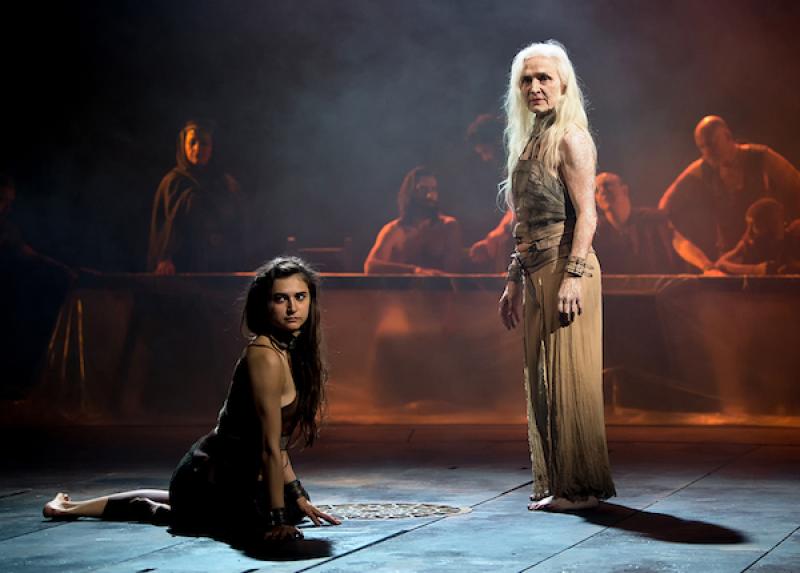Salomé, National Theatre review - Yaël Farber’s version is verbose and overblown | reviews, news & interviews
Salomé, National Theatre review - Yaël Farber’s version is verbose and overblown
Salomé, National Theatre review - Yaël Farber’s version is verbose and overblown
New twist on the biblical story gets bogged down in a portentous production

Is God female? It says a lot about Yaël Farber’s pompous and overblown new version of this biblical tale at the National Theatre that, near the end of an almighty 110-minute extravaganza, all reason seemed to have vacated my brain, and its empty halls, battered by a frenzy of elevated music, heaven-sent lighting and wildly gesturing actors, were suddenly open to the oddest ideas.
The main problem with the play is the writing
And yet. And yet it all began quite promisingly. After all, Farber (whose hits include Mies Julie and Les Blancs) is a terrific and original director, and her take on the Salomé story was bound to be intriguing. According to the programme, she has examined the sources of the Bible and of the Roman historians and concluded that Oscar Wilde’s version of the myth was more his invention than a strictly accurate account. She has also realised that, in the some of the sources, the dancer is nameless. From a feminist perspective, the conclusion is clear: the biblical Salomé is a male fantasy, so why not contest it with a female counter myth?
In this spirit, her young woman is not only Herod’s niece, but also Salomé “so called”, and her lost voice is the one that Farber wishes to restore. So she begins her version with the figure of the Nameless ancient woman (aka Salomé in old age) who is visited by Pilate, the Roman Prefect, a similarly old man who wants to know what exactly happened when Iokanaan, the holy John the Baptist, was decapitated all those years ago. For this act, ordered by Salomé, has triggered not only a zealot revolt, but caused the Crucifixion and the beginning of Christianity – not a bad score for a nameless dancer.
Farber supplies an alternative reading of the story, which unkind spirits might liken to the version promoted by The Da Vinci Code, but which has its own beauty and coherence. If anything, I thought that Farber could have gone further and absolved the dancer not only of the need to shed seven pieces of clothing, but also of the role of ordering the death of the Baptist. But never mind. In the spirit of contemporary feminism, the female body here is a metaphor for all colonised lands, modern as well as ancient. This makes the scenes between Herod, an abuser, a rapist, and the young woman undoubtedly powerful and replete with meaning. The main problem with the play, for me, is the writing. Farber’s text is an odd mixture of myth speak (“I am Chaos, Grace of Fire”) and contemporary references (stuff about taxes, profit and colonialism). It’s verbose, declamatory and manages at the same time to be both over-explicit and muddled. Sometimes, as when Herod talks about the charms he expects to find between his niece’s legs, it is hard to resist a guffaw at the ridiculousness of it all. When he says, “Your saliva is the secret source of my life” embarrassed cringing seems like an inadequate reaction.
The main problem with the play, for me, is the writing. Farber’s text is an odd mixture of myth speak (“I am Chaos, Grace of Fire”) and contemporary references (stuff about taxes, profit and colonialism). It’s verbose, declamatory and manages at the same time to be both over-explicit and muddled. Sometimes, as when Herod talks about the charms he expects to find between his niece’s legs, it is hard to resist a guffaw at the ridiculousness of it all. When he says, “Your saliva is the secret source of my life” embarrassed cringing seems like an inadequate reaction.
Still, there is a lot to enjoy in Farber’s directing and Susan Hilferty’s design. The main plus is the atmosphere of the piece. The evening begins with clouds of incense, gossamer fabrics wafting in the air, and continues with ritual gestures, the pouring of sand, wailing singers, and the deep growl of Adam Cork’s music, lit up by distant chimes. The spell is woven, only to be broken by the banality of some of the words. Although parts of the text work as a kind of biblical incantation, bathos always lurks behind some palace pillar. There is simply too much imagery, too many metaphors and too much poetic uplift. And it’s all so humourless. To distract us, figures move in slow motion around the giant Olivier stage, the constant movement propelling the narrative (and there is a lot of background detail to absorb) forward.
Oh well, at least the acting is watchable. Isabella Nefar and Olwen Fouéré convincingly play the young and the old Salomé, while Paul Chahidi lends Herod a truly salacious demeanour and Lloyd Hutchinson’s Pilate looms dictatorially over the action. As Iokanaan, the Syrian-French Ramzi Choukair (pictured above) speaks his lines – including some that come from Jesus – in a Middle-Eastern tongue, which requires a translation projected onto the back wall of the theatre, at the best of times a bit of a distraction. Still, his millenarian fantasies come across strongly. But the earth-shaking ending of the play seems to me to use a celestial battering ram, complete with angelic choirs, when maybe a quieter approach would have been more emotionally sincere, and more moving.
rating
Explore topics
Share this article
Add comment
The future of Arts Journalism
You can stop theartsdesk.com closing!
We urgently need financing to survive. Our fundraising drive has thus far raised £49,000 but we need to reach £100,000 or we will be forced to close. Please contribute here: https://gofund.me/c3f6033d
And if you can forward this information to anyone who might assist, we’d be grateful.

Subscribe to theartsdesk.com
Thank you for continuing to read our work on theartsdesk.com. For unlimited access to every article in its entirety, including our archive of more than 15,000 pieces, we're asking for £5 per month or £40 per year. We feel it's a very good deal, and hope you do too.
To take a subscription now simply click here.
And if you're looking for that extra gift for a friend or family member, why not treat them to a theartsdesk.com gift subscription?
more Theatre
 Juniper Blood, Donmar Warehouse review - where ideas and ideals rule the roost
Mike Bartlett’s new state-of-the-agricultural-nation play is beautifully performed
Juniper Blood, Donmar Warehouse review - where ideas and ideals rule the roost
Mike Bartlett’s new state-of-the-agricultural-nation play is beautifully performed
 The Gathered Leaves, Park Theatre review - dated script lifted by nuanced characterisation
The actors skilfully evoke the claustrophobia of family members trying to fake togetherness
The Gathered Leaves, Park Theatre review - dated script lifted by nuanced characterisation
The actors skilfully evoke the claustrophobia of family members trying to fake togetherness
 As You Like It: A Radical Retelling, Edinburgh International Festival 2025 review - breathtakingly audacious, deeply shocking
A cunning ruse leaves audiences facing their own privilege and complicity in Cliff Cardinal's bold theatrical creation
As You Like It: A Radical Retelling, Edinburgh International Festival 2025 review - breathtakingly audacious, deeply shocking
A cunning ruse leaves audiences facing their own privilege and complicity in Cliff Cardinal's bold theatrical creation
 Edinburgh Fringe 2025 reviews: Refuse / Terry's / Sugar
A Ukrainian bin man, an unseen used car dealer and every daddy's dream twink in three contrasting Fringe shows
Edinburgh Fringe 2025 reviews: Refuse / Terry's / Sugar
A Ukrainian bin man, an unseen used car dealer and every daddy's dream twink in three contrasting Fringe shows
 Faustus in Africa!, Edinburgh International Festival 2025 review - deeply flawed
Bringing the Faust legend to comment on colonialism produces bewildering results
Faustus in Africa!, Edinburgh International Festival 2025 review - deeply flawed
Bringing the Faust legend to comment on colonialism produces bewildering results
 Edinburgh Fringe 2025 reviews: Imprints / Courier
A slippery show about memory and a rug-pulling Deliveroo comedy in the latest from the Edinburgh Fringe
Edinburgh Fringe 2025 reviews: Imprints / Courier
A slippery show about memory and a rug-pulling Deliveroo comedy in the latest from the Edinburgh Fringe
 Edinburgh Fringe 2025 reviews: The Ode Islands / Delusions and Grandeur / Shame Show
Experimental digital performance art, classical insights and gay shame in three strong Fringe shows
Edinburgh Fringe 2025 reviews: The Ode Islands / Delusions and Grandeur / Shame Show
Experimental digital performance art, classical insights and gay shame in three strong Fringe shows
 Edinburgh Fringe 2025 reviews: Ordinary Decent Criminal / Insiders
Two dramas on prison life offer contrasting perspectives but a similar sense of compassion
Edinburgh Fringe 2025 reviews: Ordinary Decent Criminal / Insiders
Two dramas on prison life offer contrasting perspectives but a similar sense of compassion
 Edinburgh Fringe 2025 reviews: Kinder / Shunga Alert / Clean Your Plate!
From drag to Japanese erotica via a French cookery show, three of the Fringe's more unusual offerings
Edinburgh Fringe 2025 reviews: Kinder / Shunga Alert / Clean Your Plate!
From drag to Japanese erotica via a French cookery show, three of the Fringe's more unusual offerings
 The Two Gentlemen of Verona, RSC, Stratford review - not quite the intended gateway drug to Shakespeare
Shakespeare trying out lots of ideas that were to bear fruit in the future
The Two Gentlemen of Verona, RSC, Stratford review - not quite the intended gateway drug to Shakespeare
Shakespeare trying out lots of ideas that were to bear fruit in the future
 Edinburgh Fringe 2025 reviews: The Horse of Jenin / Nowhere
Two powerful shows consider the Israeli-Palestinian conflict, with mixed results
Edinburgh Fringe 2025 reviews: The Horse of Jenin / Nowhere
Two powerful shows consider the Israeli-Palestinian conflict, with mixed results
 Edinburgh Fringe 2025 reviews: The Fit Prince / Undersigned
A joyful gay romance and an intimate one-to-one encounter in two strong Fringe shows
Edinburgh Fringe 2025 reviews: The Fit Prince / Undersigned
A joyful gay romance and an intimate one-to-one encounter in two strong Fringe shows

Comments
All your critics' bafflement